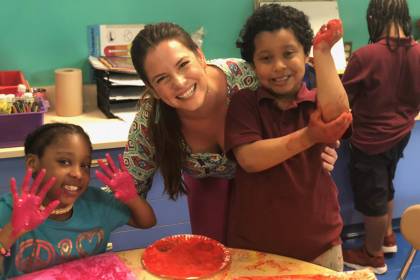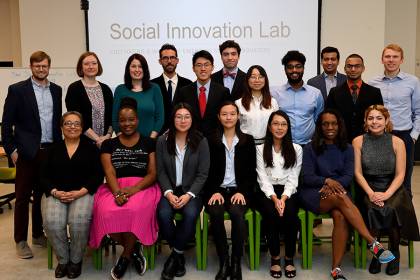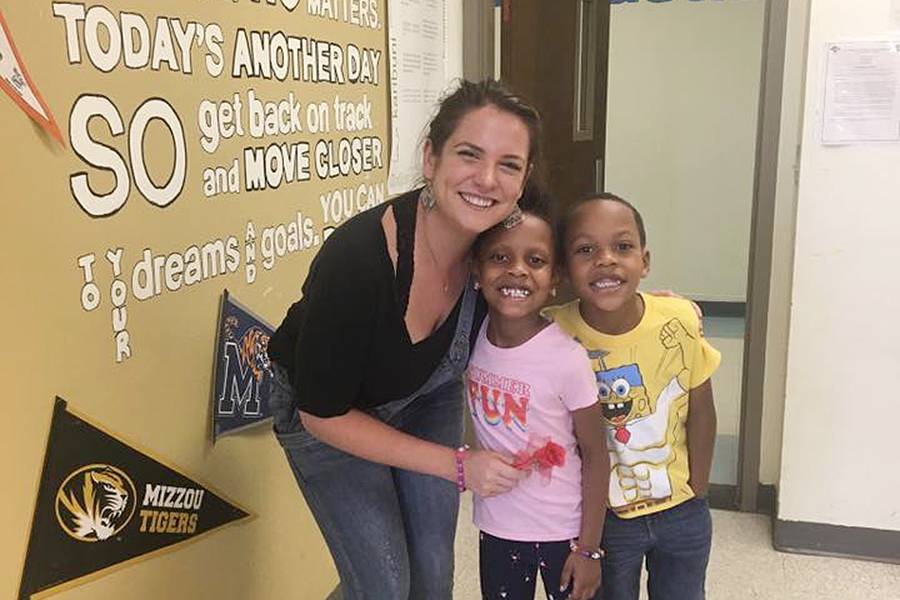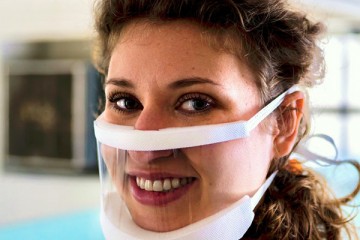As a teacher for Baltimore City Public Schools, Danna Thomas frequently found herself becoming a source of stability, structure, and support for students whose home lives lacked those qualities. The responsibility was a point of pride for her—it was her life's mission, she believed, to help children through teaching.
But she worked in conditions plagued by funding shortages, degraded and dangerous buildings, and rampant personnel mismanagement. She was affected by the traumas her students brought with them, too—parental suicides, exposure to gun violence, extreme poverty.
Despite her drive to make a difference in the lives of her students, she felt herself burning out from the stress and the secondhand trauma she experienced on the job.
"I thought teacher stress was limited to new teachers—and it's true that we lose 46 percent of teachers in the first five years, and that nationally, costs associated with teacher turnover exceed $2.6 billion a year, $100 million in Maryland alone," says Thomas, who, as a 2013 graduate of the Johns Hopkins School of Education with a master's degree in data-driven instruction, is fluent in the language of statistics and teacher attrition.
"I came to find out that it wasn't just new teachers who were stressed out, it's everybody. New and veteran teachers, in public and private schools, in rural and urban areas. It really is a pandemic."

Image caption: Thomas spent seven years as a teacher in Baltimore City before launching Happy Teacher Revolution
Image credit: Courtesy of Danna Thomas
In 2015, Thomas convened the first meeting of Happy Teacher Revolution, a movement born in Baltimore that has since spread internationally with a mission to support the mental health and well-being of teachers. Modeled on 12-step programs such as Alcoholics Anonymous, Happy Teacher Revolution promotes social-emotional sharing, professional development, and self-care for teachers through support groups and an online curriculum.
Thomas has already introduced Happy Teacher Revolution in 13 states and to an international site in Dakar, Senegal. She is laying the groundwork to spread the program to parts of China.
Thomas will get the chance to grow the revolution and scale it for international success with the help and guidance of the Johns Hopkins Social Innovation Lab, an intensive six-month accelerator program that provides funding, mentoring, workshops, and office space to emerging business and nonprofit leaders whose ideas have an altruistic aim.
Thomas is one of 10 business venture leaders to join the program's 2018-19 cohort, which was announced last month. During an event at FastForward U Homewood, a new maker space and work hub launched by Johns Hopkins Technology Ventures in Baltimore's Remington neighborhood, the new cohort of business leaders met to discuss their projects and their goals for the program. The group includes projects that provide food to those with chronic health conditions in Baltimore, a virtual reality education platform, and a social platform for celebrating immigrants, among others.
"This was our most competitive round of applications ever, and it shows the depth of good work happening here in Baltimore that the Social Innovation Lab is humbled to support," says Alex Riehm, director of the Social Innovation Lab. "The real strength of the Social Innovation Lab comes from the cohort-based learning model, where teams with diverse objectives support each other on shared challenges. I'm looking forward to seeing this year's cohort come together to support each other."

Image caption: The 2018-19 cohort of the Social Innovation lab
Image credit: Will Kirk / Johns Hopkins University
Since 2011, the Social Innovation Lab has helped 72 ventures secure more than $37.5 million in funding for their ideas. This year, more than half of the cohort's ventures are led by community members who are not affiliated with Johns Hopkins University. Eight of the 10 are led by women, and 8 of the 10 are led by entrepreneurs from minority groups.
Each venture is awarded $1,000 in seed funding with the opportunity to win up to $25,000 from the Abell Foundation.
Thomas says she's most looking forward to the opportunity to learn business skills alongside other entrepreneurs.
"In terms of an entrepreneur's life, it can seem really lonely and isolating—sort of like it was in teaching, where you don't have many opportunities to connect with one another," she says. "So that's what I'm looking forward to with the Social Innovation Lab. We're all doing really great work in these different fields, but this is an opportunity for us to connect and grow as a community."
The other members of the 2018-19 Social Innovation Lab cohort are:
Fight Blight Bmore, an economic, environmental, and social justice initiative addressing the issue of blight, led by the village and informed by the data. The core team leader is community member Nneka Nnamdi.
Ask Rose, a digital platform that pairs a patient to a therapist and can serve as an AI chatbot for behavioral therapy. The core member is Kavi Misrilall, a graduate student at the Johns Hopkins Carey Business School.
The Baltimore Farm to Clinic Project, which works with local farms to provide patients who struggle with chronic medical conditions and food insecurity with fresh vegetables in an effort to reduce food insecurity and improve health. The team is made up of community members and Johns Hopkins affiliates, and is led by Kate Rediger and Bailey Miles.
MOMCares, which provides postpartum doula support to black mothers navigating a NICU experience with their child. The core member is Ana Rodney.
Ars Medica, a social venture that promotes dialogue among the arts and sciences to enhance the quality of medical education. Team members are Johns Hopkins students, staff, and alumni, and the core members are Javier de la Maza, Taj Keshav, Marielle Bugayong, and Jianyi Nie.
Health 3D, a student-run social enterprise that creates 3D-printed equipment to fill treatment gaps in health care. The core team members include Jody Mou, Chris Shallal, Kirby Leo, Simon Liu, Nicky Zhang, and Kavya Anjur.
Roots and Raices is a social enterprise geared toward creating a platform for immigrant artists and musicians to come together to support, highlight, and celebrate the importance of immigrants in Baltimore. The core team leader is community member Valería Fuentes.
Baltimore Job Hunters Support Group, which assists older unemployed workers with the social, emotional, and psychological pain that come with mid-career job loss by providing counseling, coaching, outreach, and advocacy. The core team leader is Johns Hopkins alum Janet Glover-Kerkvliet.
The Be. Org, a youth-built experiential learning platform that uses virtual reality for social-emotional learning outcomes. The core team leader is Tonee Lawson.









